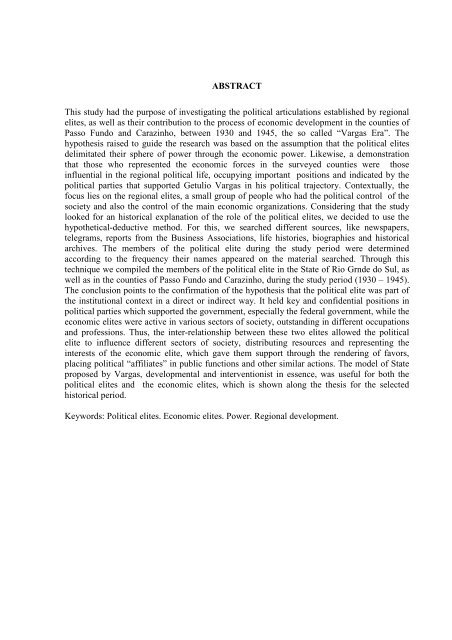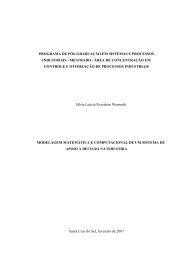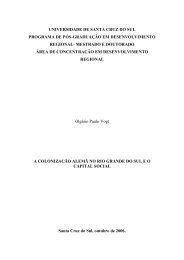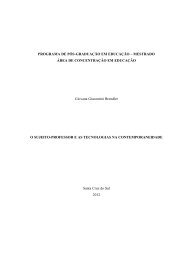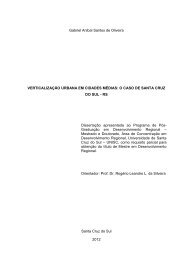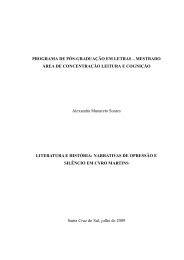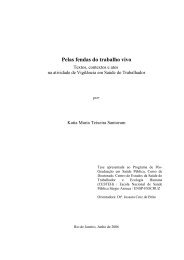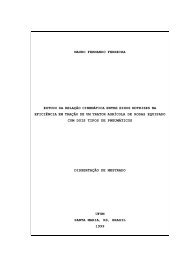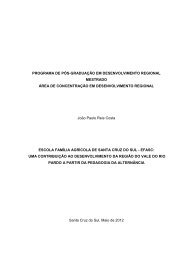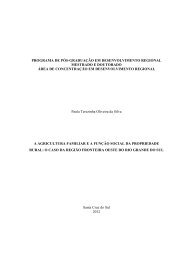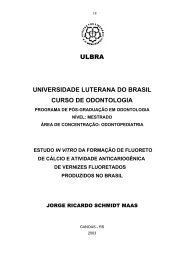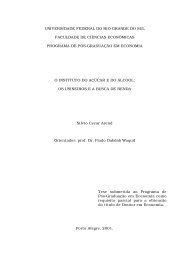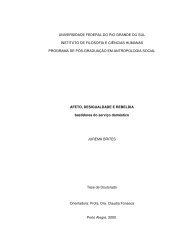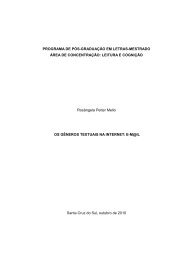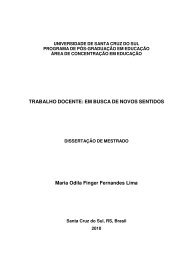- Page 1 and 2:
PROGRAMA DE PÓS-GRADUAÇÃO EM DES
- Page 3 and 4:
Maria Eloisa Cavalheiro “SABES CO
- Page 5 and 6:
AGRADECIMENTOS Ao Professor Dr. Má
- Page 7 and 8:
RESUMO Este estudo teve a finalidad
- Page 9 and 10:
LISTA DE QUADROS 1 - Comparativo da
- Page 11 and 12:
LISTA DE TABELAS 1 - Produtos expor
- Page 13 and 14:
SUMÁRIO INTRODUÇÃO..............
- Page 15 and 16:
INTRODUÇÃO A reflexão sobre os p
- Page 17 and 18:
elite política e elite econômica,
- Page 19 and 20:
estruturante. A historiografia bras
- Page 21 and 22:
setor de bens de consumo, com a for
- Page 23 and 24:
sobre a égide da racionalidade cap
- Page 25 and 26:
designação. Dessa forma, analisam
- Page 27 and 28:
político da sociedade da época oc
- Page 29 and 30:
pois por meio de cinejornais 38 e d
- Page 31 and 32:
de permitir captar as aspirações
- Page 33 and 34:
Essas variações submetem-se às n
- Page 35 and 36:
histórico, encontram-se expostas a
- Page 37 and 38:
entra a reportagem e na edição da
- Page 39 and 40:
por si mesmo ou por seus pares. Des
- Page 41 and 42:
1 ATUAÇÃO E O COMPORTAMENTO DAS E
- Page 43 and 44:
Nessa mesma linha, o período entre
- Page 45 and 46:
oligarquias agrárias assentara-se,
- Page 47 and 48:
Na virada da década de 1940, amort
- Page 49 and 50:
O Governo Provisório continua fort
- Page 51 and 52:
tudo e sinceramente ambicionava. Os
- Page 53 and 54:
duas metrópoles coloniais ainda co
- Page 55 and 56:
Pinheirais”, maior empório madei
- Page 57 and 58:
A região, para Mesquita 91 , é um
- Page 59 and 60:
ou sob a dependência político-adm
- Page 61 and 62:
não haviam se vinculado às corren
- Page 63 and 64:
forte movimentação, na qual se so
- Page 65 and 66:
Igualmente em Carazinho, no pós-30
- Page 67 and 68:
partidos: o PSD e o PTB. A este úl
- Page 69 and 70:
trajetória bastante semelhante à
- Page 71 and 72:
Dessa forma, o conceito de polític
- Page 73 and 74:
Penso que é no campo da renovaçã
- Page 75 and 76:
controlam os vários segmentos do c
- Page 77 and 78:
denominando-se de aristocracia ou e
- Page 79 and 80:
O termo “elites” pode ser conce
- Page 81 and 82:
arena política 166 . Mannheim 167
- Page 83 and 84:
aqueles que ocupam tais postos em o
- Page 85 and 86:
desenvolvimento da região do Plana
- Page 87 and 88:
coação para consegui-lo, não obs
- Page 89 and 90:
política rio-grandense, bem como s
- Page 91 and 92:
enquanto que a ala “nacional”,
- Page 93 and 94:
iniciativa privada e, a seguir, em
- Page 95 and 96:
2 AS ELITES POLÍTICAS NO PLANALTO
- Page 97 and 98:
Imprensa e Propaganda (DIP) 211 sob
- Page 99 and 100:
de pensamentos modernizantes, mas s
- Page 101 and 102:
ambiente social e possibilitando ao
- Page 103 and 104:
de 450 homens, que partiram para as
- Page 105 and 106:
interventor federal do Rio Grande d
- Page 107 and 108:
Os textos publicados no Jornal da S
- Page 109 and 110:
Guilherme Sudbrack e Alberico Azeve
- Page 111 and 112:
No decorrer da pesquisa constatamos
- Page 113 and 114:
113 Antes de mais nada, diremos que
- Page 115 and 116:
e ao Exército, puseram em dúvida
- Page 117 and 118:
diretamente ao processo de desenvol
- Page 119 and 120:
119 [...] a mudança do relacioname
- Page 121 and 122:
longo dos anos 273 . O grupo polít
- Page 123 and 124:
evolucionários de Vacaria, Lagoa V
- Page 125 and 126:
partidária fosse formada, de modo
- Page 127 and 128:
2.4.1 As eleições para a Constitu
- Page 129 and 130:
129 É o seguinte o teor da nota di
- Page 131 and 132:
Em Passo Fundo, o tenente Cúrio de
- Page 133 and 134:
133 Rio 16- foi um verdadeiro acont
- Page 135 and 136:
eleições de 1934 311 . Acompanhan
- Page 137 and 138:
Nesse contexto histórico, de recon
- Page 139 and 140:
em Passo Fundo eram os cirurgiões-
- Page 141 and 142:
Percebemos que para a Câmara Feder
- Page 143 and 144:
força que possuía no ano de 1933;
- Page 145 and 146:
foi recebido festivamente e a quem
- Page 147 and 148:
Diante da situação nacional, em 1
- Page 149 and 150:
2.5.1 O Estado Novo O período do E
- Page 151 and 152:
apelo para um futuro diferente 355
- Page 153 and 154:
novembro do corrente ano, já tives
- Page 155 and 156:
com raras exceções 371 . No pará
- Page 157 and 158:
Colussi 381 em 26 de novembro de 19
- Page 159 and 160:
Rocha; Santa Vitória - José Maria
- Page 161 and 162:
tempo, houve a repressão represent
- Page 163 and 164:
também é o preito de admiração
- Page 165 and 166:
outra que seja oposta” 403 . Suce
- Page 167 and 168:
quanto das representações mentais
- Page 169 and 170:
169 perturbarem a ordem derrubando
- Page 171 and 172:
Nesse sentido, as alianças formada
- Page 173 and 174:
as de 1933, conforme comprovamos pe
- Page 175 and 176:
No ano de 1935 foram realizadas ele
- Page 177 and 178:
Centro Republicano Borges de Medeir
- Page 179 and 180:
Carazinho tivemos a fundação do C
- Page 181 and 182:
estudado, demonstraram manter uma c
- Page 183 and 184:
interventor no Rio Grande do Sul, e
- Page 185 and 186:
Brasil, inconformados com a extinç
- Page 187 and 188:
E prosseguia o editorial: 187 O sr,
- Page 189 and 190:
meio do imaginário social. 2.7.2 A
- Page 191 and 192:
Segundo Soares, Vazulmiro Dutra, me
- Page 193 and 194:
nos seguintes termos: 193 [...] fun
- Page 195 and 196:
obstáculo aos objetivos centralist
- Page 197 and 198:
197 Bastos, Innocêncio Schleder, L
- Page 199 and 200:
Aristóteles Lima 486 . Também com
- Page 201 and 202:
clarificava que Frente Única e Dis
- Page 203 and 204:
inconsciente as raízes das convic
- Page 205 and 206:
2.7.3 As divergências provocadas p
- Page 207 and 208:
207 o herói simboliza a identidade
- Page 209 and 210:
três prefeitos nomeados e em perí
- Page 211 and 212:
essa resolveu aguardar solução ca
- Page 213 and 214:
Disse, ainda, que as atividades dos
- Page 215 and 216:
concedidos por Vargas, mas, em rela
- Page 217 and 218:
também ao PTB em sua fase inicial.
- Page 219 and 220:
política, dando ênfase à candida
- Page 221 and 222:
221 Rio- comunicamos V.Exa. que Pas
- Page 223 and 224:
223 máxima da nacionalidade, aplau
- Page 225 and 226:
perepistas 555 . Ainda em 1945, no
- Page 227 and 228:
lideranças políticas de Passo Fun
- Page 229 and 230:
Com base no estudo deste capítulo,
- Page 231 and 232:
Dentre os autores que se destacam c
- Page 233 and 234:
Assim é que na Era Vargas a econom
- Page 235 and 236:
produção para garantir o abasteci
- Page 237 and 238:
237 [...] a) que mais convinha, col
- Page 239 and 240:
diretamente relacionado com a vari
- Page 241 and 242:
locais. Para Pesavento 598 ,“o pr
- Page 243 and 244:
presente na obtenção de um lucro
- Page 245 and 246:
seja, o comerciante da área coloni
- Page 247 and 248:
Brasil durante a maior parte do sé
- Page 249 and 250:
governo federal, por representar um
- Page 251 and 252:
vinho, com a primeira obtendo o lug
- Page 253 and 254:
foro de demandas amplamente definid
- Page 255 and 256:
desenvolvimentista, na medida em qu
- Page 257 and 258:
A correlação entre a estrutura li
- Page 259 and 260:
contexto é encontrado nas atas de
- Page 261 and 262:
egião do Planalto Médio, ou seja,
- Page 263 and 264:
alavancadores do seu desenvolviment
- Page 265 and 266:
Oribe Marques, industrialista de he
- Page 267 and 268:
Antero Marcelino da Silva Junior, e
- Page 269 and 270:
O município de Passo Fundo era atr
- Page 271 and 272:
orçamentária na importância de 3
- Page 273 and 274:
menos se investia em saúde, educa
- Page 275 and 276:
novo padrão adotado pela Repúblic
- Page 277 and 278:
encaminhar e propor alternativas pa
- Page 279 and 280:
A questão da luz, assunto permanen
- Page 281 and 282:
281 República, para entender-se co
- Page 283 and 284:
interpretando aspirações e demand
- Page 285 and 286:
Tabela 1 - Produtos exportados em C
- Page 287 and 288:
O prefeito Hillebrand empenhara-se
- Page 289 and 290:
feriados nacionais, escrita da esco
- Page 291 and 292:
prejudicando a atividade de qualque
- Page 293 and 294:
sobre rendas e consignações - 799
- Page 295 and 296:
O jornal concluía sua abordagem so
- Page 297 and 298:
297 [...] exercício 1939 com saldo
- Page 299 and 300:
Também havia sido aprovada a lei o
- Page 301 and 302:
Tabela 8 - População por situaç
- Page 303 and 304:
Quando se analisa o produto interno
- Page 305 and 306:
Ao chegar ao governo, em 1930, Varg
- Page 307 and 308:
acordo, opuseram-se a Flores e ao p
- Page 309 and 310:
309 dia 14 de outubro, estacionando
- Page 311 and 312:
311 voluntário, deitado no túmulo
- Page 313 and 314:
313 Não sei se o sr. Diretor 766 t
- Page 315 and 316:
Finalmente, ao contrário do notici
- Page 317 and 318:
317 geral de preços, agravadas por
- Page 319 and 320:
3.2.1 Em Passo Fundo A localizaçã
- Page 321 and 322:
do momento, como ocorreu no caso do
- Page 323 and 324:
323 [...] causou justa satisfação
- Page 325 and 326:
Uruguai, passando a ocupar o seu lu
- Page 327 and 328:
(como no Estado Novo), ou de mascar
- Page 329 and 330:
empregados, sob a presidência de u
- Page 331 and 332:
331 Carazinho, 1, (Via postal) - A
- Page 333 and 334:
economia. A guerra funcionou como p
- Page 335 and 336:
335 [...] embora positivamente valo
- Page 337 and 338:
crenças e valores. De acordo com F
- Page 339 and 340:
339 (a) a lei de 1931 exigindo que
- Page 341 and 342:
ferroviários, aquisição da Frota
- Page 343 and 344:
país da falta de uma política de
- Page 345 and 346:
eficiente do ensino. No primeiro se
- Page 347 and 348:
sentido, formou-se uma liga pró-en
- Page 349 and 350:
349 higiene pública, a prefeitura
- Page 351 and 352:
Também na área da saúde a elite
- Page 353 and 354:
policial regulamentada pelo decreto
- Page 355 and 356:
O trabalho aprofundou-se pela pesqu
- Page 357 and 358:
cenário político, pois para inves
- Page 359 and 360:
No caso específico da proposta de
- Page 361 and 362:
própria. Carazinho, de 4º distrit
- Page 363 and 364:
Em nível regional, o modelo de Est
- Page 365 and 366:
época se preocuparem tanto em sali
- Page 367 and 368:
BOBBIO, Norberto; MATTEUCCI, Nicola
- Page 369 and 370:
COLUSSI, Eliane Lucia. Estado novo
- Page 371 and 372:
FONSECA, Pedro Cezar Dutra. Vargas:
- Page 373 and 374:
LEVINE, Robert M. O regime de Varga
- Page 375 and 376:
POULANTZAS, Nicos. Poder político
- Page 377 and 378:
__________.Colonos, carreteiros e c
- Page 379 and 380:
PASSO FUNDO. Lei de Orçamento da R
- Page 381 and 382:
Fundação de Economia e Estatísti
- Page 383 and 384:
ANEXO A - Mapas do Rio Grande do Su
- Page 385 and 386:
Iraí Sarandi Carazinho Getúlio Va
- Page 387 and 388:
Adroaldo Mesquita da Costa Affonso
- Page 389 and 390:
Antonio Bittencourt de Azambuja Ant
- Page 391 and 392:
Ataliba de Figueiredo paz Atos de M
- Page 393 and 394:
César José dos Santos Cypriano da
- Page 395 and 396:
Egydio Michaelsen Eloi José da Roc
- Page 397 and 398:
Francisco de Souza Ribeiro Dantas,
- Page 399 and 400:
Hypolito Ribeiro Jr., Ten. Cel. Ild
- Page 401 and 402:
Joaquim Pedro RC 1935 -1937 Deputad
- Page 403 and 404:
Luciano Corrêa Machado PSD PSD a 1
- Page 405 and 406:
Nestor Jost PSD PSD Ney Câmara PRP
- Page 407 and 408:
Ozorio Tuiuty Oliveira Freitas Paul
- Page 409 and 410:
Barbosa PRL Rodrigo Magalhães dos
- Page 411 and 412:
ANEXO C - Tabelas do resultado das
- Page 413 and 414:
PRL 1932 Sub-prefeito do 7º. Distr
- Page 415 and 416:
Arthur Ferreira Filho Militar - Cor
- Page 417 and 418:
Bocaiúva Poeta Militar - Major PRL
- Page 419 and 420:
Eduardo Rocca PRR PRL 1932 1934 Mem
- Page 421 and 422:
PRL 1932 Membro do PRL em 1934 Comi
- Page 423 and 424:
PP 1935 Firma: Casa Miotto João Ba
- Page 425 and 426:
FUG 1934 Comissão fiscal da Associ
- Page 427 and 428:
Mário Goelzer Agricultor PSD 1945
- Page 429 and 430:
Nicandro Oltramari PRR PRL Nicolau
- Page 431 and 432:
Paulo Dal Oglio Comerciante Paulo L
- Page 433 and 434:
Sebastião Castilhos AIB 1935 Secre
- Page 435 and 436: Comissão de sindicância da Associ
- Page 437 and 438: Alcides Albuquerque Industrialista,
- Page 439 and 440: Antonio Sturm P.L 1932 Antonio Varg
- Page 441 and 442: Canderoy Pinto Lima Oficial do regi
- Page 443 and 444: Everaldo Padilha Técnico Rural PRR
- Page 445 and 446: PRL 1932 Dissidente Liberal. PRR 19
- Page 447 and 448: João Marck Fórum Industrial Firma
- Page 449 and 450: Leopoldo Kümmer Comerciante Membro
- Page 451 and 452: Pedro Carlos Bins PRL 1932 Fundo, c
- Page 453 and 454: vereador UDN 1947-1951 Presidente d
- Page 455 and 456: João Zewes Pró-Hillebrand Joaquim
- Page 457 and 458: Henrique Scarpellini Ghezzi 1º sec
- Page 459 and 460: Ernesto Morsch Comissão fiscal Edu
- Page 461 and 462: Hélio Morsch Comissão de sindicâ
- Page 463 and 464: Henrique Scarpellini Ghezzi Recondu
- Page 465 and 466: Francisco Bertowitz Conselho fiscal
- Page 467 and 468: ANEXO H- Quadro de Integrantes da E
- Page 469 and 470: Hugo Fetzer Conselho fiscal Wilmar
- Page 471 and 472: Raymundo Kloeckner 2º tesoureiro A
- Page 473 and 474: Ernesto Dable 1º Secretário Olint
- Page 475 and 476: ANEXO I- Quadro da Situação indus
- Page 477 and 478: ANEXO J- Quadro da Situação indus
- Page 479 and 480: d) selaria e sapataria e) selaria e
- Page 481 and 482: Maria Eloisa Cavalheiro “SABES CO
- Page 483 and 484: Ao meu marido, José Antônio Pinto
- Page 485: Só fazemos melhor aquilo que repet
- Page 489 and 490: LISTA DE GRÁFICOS 1 - Resultado da
- Page 491 and 492: AIB Aliança Integralista Brasileir
- Page 493 and 494: 3.2 As decisões políticas e o alc
- Page 495 and 496: Temos procurado, em nossos trabalho
- Page 497 and 498: populares com o intento de construi
- Page 499 and 500: dinheiro, que se transformou em cap
- Page 501 and 502: Igualmente, foi nessa situação, m
- Page 503 and 504: Dessa forma, consideramos a existê
- Page 505 and 506: Seguindo essa linha de raciocínio
- Page 507 and 508: valores semânticos vizinhos que se
- Page 509 and 510: futuro coletivos distintos dos que
- Page 511 and 512: olhar dos narradores e autores serv
- Page 513 and 514: lutas e no acúmulo de trabalho e d
- Page 515 and 516: apresenta os elementos de interpret
- Page 517 and 518: o título escolhido foi outro, isto
- Page 519 and 520: história política está intimamen
- Page 521 and 522: Os enfrentamentos foram liderados p
- Page 523 and 524: autoritário e superior, em termos
- Page 525 and 526: locais. Revelava-se um projeto ultr
- Page 527 and 528: e setores profissionais 76 . A ilus
- Page 529 and 530: usei dos meios mais suasórios e da
- Page 531 and 532: estruturas de autoridade ou de dist
- Page 533 and 534: Na beira do caminho dos tropeiros s
- Page 535 and 536: da pecuária; da não pacificidade
- Page 537 and 538:
a homogeneidade é à base da deter
- Page 539 and 540:
deslocavam de São Paulo para o sul
- Page 541 and 542:
propaganda e divulgação do progra
- Page 543 and 544:
caracterizada por atividades comerc
- Page 545 and 546:
Brasileira, de direita, e a Alianç
- Page 547 and 548:
dominantes, mas a experiência most
- Page 549 and 550:
configurando a atual estrutura soci
- Page 551 and 552:
diferentes das encontradas na área
- Page 553 and 554:
muitas formas de poder do homem, se
- Page 555 and 556:
futuro será o único autorizado a
- Page 557 and 558:
pelos membros dessa classe [...] 15
- Page 559 and 560:
se inter-relacionam, fazendo surgir
- Page 561 and 562:
indicado, pode indicar os mais dive
- Page 563 and 564:
Os conceitos delineadores desta pes
- Page 565 and 566:
tais como os interesses culturais,
- Page 567 and 568:
industriais para substituir as merc
- Page 569 and 570:
de suas propriedades. Em contraposi
- Page 571 and 572:
De acordo com o supracitado, Charle
- Page 573 and 574:
Quanto ao Rio Grande do Sul, as eli
- Page 575 and 576:
período de 1930 a 1945 permite-nos
- Page 577 and 578:
órgão eqüidistante dos partidos,
- Page 579 and 580:
egional. Carazinho ainda era o 4º
- Page 581 and 582:
oposição. Nesse cenário, à medi
- Page 583 and 584:
104 Carazinho - sede do 4º distrit
- Page 585 and 586:
estrutura para tal 231 . Corroboran
- Page 587 and 588:
108 pelo vilamento daquela localida
- Page 589 and 590:
compensação, receberia uma porç
- Page 591 and 592:
2.2 Características gerais das eli
- Page 593 and 594:
no restante do país. Portanto, a o
- Page 595 and 596:
denominada “política dos governa
- Page 597 and 598:
interesses particulares da elite po
- Page 599 and 600:
Com base nas considerações feitas
- Page 601 and 602:
de 1932, Flores da Cunha optou por
- Page 603 and 604:
2.4 A rearticulação do sistema pa
- Page 605 and 606:
Vergueiro, como líder dos republic
- Page 607 and 608:
o Rio Grande disposto a mobilizar t
- Page 609 and 610:
epouso que necessita. Diz que se to
- Page 611 and 612:
Gráfico 1 - Resultado das eleiçõ
- Page 613 and 614:
134 todos os brasileiros encontrem
- Page 615 and 616:
Logo, não se trata de substituir a
- Page 617 and 618:
voto dos fiéis, mediante a aceita
- Page 619 and 620:
Passo Fundo, governada por Armando
- Page 621 and 622:
Da mesma forma, as eleições para
- Page 623 and 624:
Nelson Pereira Ehlers para o perío
- Page 625 and 626:
confronto, até na questão da suge
- Page 627 and 628:
possibilitava a pacificação em tr
- Page 629 and 630:
contribui na produção do imaginá
- Page 631 and 632:
intervencionista e corporativista 3
- Page 633 and 634:
154 Se o prestigio nasce da atribui
- Page 635 and 636:
acabara também com a fonte de expl
- Page 637 and 638:
Liberal no sentido de unir, definit
- Page 639 and 640:
Embora todas as obras consultadas d
- Page 641 and 642:
grupos para pressionar o poder púb
- Page 643 and 644:
Vargas e para evitar a violência,
- Page 645 and 646:
epresentação visual. Assim relata
- Page 647 and 648:
em público em detrimento dos inter
- Page 649 and 650:
segmentos estatais 416 . Evidenteme
- Page 651 and 652:
(grifos nosso). A composição das
- Page 653 and 654:
No ano de 1932, assinalado pela Rev
- Page 655 and 656:
governava o país com Getúlio Varg
- Page 657 and 658:
político” 433 . Em Carazinho, o
- Page 659 and 660:
O documento, pelo seu teor agressiv
- Page 661 and 662:
2.7 Pontos convergentes e divergent
- Page 663 and 664:
As elites políticas, em nível nac
- Page 665 and 666:
foi indicado para concorrer ao mesm
- Page 667 and 668:
FUG. Independentemente da informaç
- Page 669 and 670:
embora tal fato causasse desconfort
- Page 671 and 672:
192 a permanência dos antigos flor
- Page 673 and 674:
uma Assembléia Nacional Constuinte
- Page 675 and 676:
que, no choque de forças política
- Page 677 and 678:
aceitariam os órgãos da ação pa
- Page 679 and 680:
elegessem os candidatos por ela apr
- Page 681 and 682:
Vargas expediram o Boletim Document
- Page 683 and 684:
se tornariam ações internacionais
- Page 685 and 686:
Em maio de 1945, mais precisamente
- Page 687 and 688:
estado resolvera exonerar Hillebran
- Page 689 and 690:
atividades profissionais com as qua
- Page 691 and 692:
estadual havia eleito Getúlio Varg
- Page 693 and 694:
Borges de Medeiros à cena polític
- Page 695 and 696:
espeito desse assunto já era bem c
- Page 697 and 698:
O jornal O Nacional, em 17 de julho
- Page 699 and 700:
fraternidade, que estavam sendo at
- Page 701 and 702:
Importante se faz ainda ressaltar q
- Page 703 and 704:
entendimentos e exame da situação
- Page 705 and 706:
Federal e de Minas Gerais, porém e
- Page 707 and 708:
discurso foi o ponto relevante dest
- Page 709 and 710:
3 A ATUAÇÃO DAS ELITES POLÍTICAS
- Page 711 and 712:
identificar, perceber, agir, como,
- Page 713 and 714:
3.1 As decisões políticas - nacio
- Page 715 and 716:
Nesse contexto, precisamos retomar
- Page 717 and 718:
Guerra, quando o governo sentiu nec
- Page 719 and 720:
O envolvimento nas grandes economia
- Page 721 and 722:
econômica que tal integração e c
- Page 723 and 724:
Capital. O sr. Mauricio Cardoso fic
- Page 725 and 726:
dirigiu diversos telegramas ao Gove
- Page 727 and 728:
centralizadora, que estava embasada
- Page 729 and 730:
Quadro 3 - Dados estatísticos em t
- Page 731 and 732:
Dessa forma, o quadro que se deline
- Page 733 and 734:
problemas econômicos das regiões
- Page 735 and 736:
Para tanto, no setor da pecuária,
- Page 737 and 738:
258 Sobre a viação, se o Departam
- Page 739 and 740:
transcrito do jornal, em que a aç
- Page 741 and 742:
262 de influência no novo porto. E
- Page 743 and 744:
desenvolvimento econômico, e tamb
- Page 745 and 746:
despesa estabelecida em 1.080:000$0
- Page 747 and 748:
O guia ilustrado comercial, industr
- Page 749 and 750:
No mesmo sentido, em 1939 foram enf
- Page 751 and 752:
lentilha, 10.600; da cebola, 32.800
- Page 753 and 754:
Diante do quadro 4, deduzimos a imp
- Page 755 and 756:
especializavam-se no abastecimento
- Page 757 and 758:
Férrea, e hoje é uma cidade inter
- Page 759 and 760:
Ratificando as solicitações dos e
- Page 761 and 762:
282 aceitou. Que a organização do
- Page 763 and 764:
de classe para o crescimento das re
- Page 765 and 766:
Quadro 5 - Representativo do valor
- Page 767 and 768:
vista já haver saldo positivo no e
- Page 769 and 770:
prédios; 1932 - 902 prédios; 1933
- Page 771 and 772:
Em dezembro de 1939 o Jornal da Ser
- Page 773 and 774:
Quanto ao orçamento municipal para
- Page 775 and 776:
5 o distrito - 6.092$000; nas estra
- Page 777 and 778:
O prefeito Hillebrand sempre procur
- Page 779 and 780:
ocupadas num determinado tempo, con
- Page 781 and 782:
Passo Fundo possuía um total de 75
- Page 783 and 784:
Conforme dados demonstrados na Tabe
- Page 785 and 786:
atacadista, hoteleiro, jornalista e
- Page 787 and 788:
308 desinteressarem dos destinos da
- Page 789 and 790:
310 1- O dr. Araújo Vergueiro foi
- Page 791 and 792:
não podia prescindir do reconhecim
- Page 793 and 794:
314 delatar, a todo pulmão, ao pai
- Page 795 and 796:
316 a revolução de 1930 não só
- Page 797 and 798:
318 levarem a feito a organização
- Page 799 and 800:
militares, funcionários públicos
- Page 801 and 802:
ascensão de Flores da Cunha como i
- Page 803 and 804:
324 exmo. Sr. Cel. Interventor Fede
- Page 805 and 806:
industriais, agropecuaristas e prof
- Page 807 and 808:
O poder econômico, evidenciado no
- Page 809 and 810:
330 Com a fundação do Sindicato d
- Page 811 and 812:
332 riqueza da pátria. Infelizment
- Page 813 and 814:
percepção da necessidade de o pa
- Page 815 and 816:
Notamos, com referência ao relatad
- Page 817 and 818:
transformação das relações de p
- Page 819 and 820:
palavra aos presentes para agradece
- Page 821 and 822:
342 despreparo e subserviência da
- Page 823 and 824:
344 Considerando que todas as escol
- Page 825 and 826:
346 entrância. Instrução Particu
- Page 827 and 828:
Nesse sentido, a idéia de progress
- Page 829 and 830:
350 Lainha Marques Rocha, president
- Page 831 and 832:
Correio do Povo demonstra que, embo
- Page 833 and 834:
estabelecendo normas legais para o
- Page 835 and 836:
pelo poder econômico, interferiam
- Page 837 and 838:
CONCLUSÃO No estudo realizado na p
- Page 839 and 840:
através desses canais poderia ser
- Page 841 and 842:
Analisando os componentes das elite
- Page 843 and 844:
econômicas, pelo próprio poder ec
- Page 845 and 846:
REFERÊNCIAS ABREU, Alzira Alves de
- Page 847 and 848:
__________.História política. Est
- Page 849 and 850:
FÉLIX, Loiva Otero. A fabricação
- Page 851 and 852:
GRAMSCI, Antônio. Os intelectuais
- Page 853 and 854:
MÜLLER, Geraldo. A economia gaúch
- Page 855 and 856:
__________.São Paulo e o Estado na
- Page 857 and 858:
1982. VIANNA, Oliveira F. Problemas
- Page 859 and 860:
FONTES DE IMPRENSA LOCAL A FEDERAÇ
- Page 861 and 862:
PROGRAMA DE PÓS-GRADUAÇÃO EM DES
- Page 863 and 864:
Mapa 2 - Mapa da evolução adminis
- Page 865 and 866:
Anexo B - Quadro de Integrantes da
- Page 867 and 868:
Alfredo Soares do Nascimento, Dr. A
- Page 869 and 870:
Dornelles Assembléia Legislativa,
- Page 871 and 872:
Carrion a 12/1948 mandato parlament
- Page 873 and 874:
Décio Martins Costa Demetrio Merci
- Page 875 and 876:
Freitas Castro PSD 16/08/1950 11/01
- Page 877 and 878:
Guido Mondin PRP 10/1948 a 11/1948
- Page 879 and 880:
Castro RC 04/1936 a 01/1937 Represe
- Page 881 and 882:
Julio Teixeira PC do B PC do B Juli
- Page 883 and 884:
Marcial Terra Frente Única PSD Mar
- Page 885 and 886:
Oliverio de Deus Vieira Filho Oscar
- Page 887 and 888:
Protásio Dornelles Vargas, Dr. Rau
- Page 889 and 890:
Ulisses Rodrigues Unirio Carreira M
- Page 891 and 892:
Anexo D - Quadro de Integrantes da
- Page 893 and 894:
Aristóteles Lima Comerciante PRL F
- Page 895 and 896:
Arthur Pretto Comerciante PRR FUG P
- Page 897 and 898:
César Santos Médico PL PRL PTB 19
- Page 899 and 900:
Faustino Rodrigues Militar - Corone
- Page 901 and 902:
FUG 1934 Higino Garcez PRL 1932 Mem
- Page 903 and 904:
João Scherer Militar - Capitão PR
- Page 905 and 906:
Luiz Magalhães Militar - Coronel P
- Page 907 and 908:
Moacir Índio da Costa PRR 1930 Pre
- Page 909 and 910:
Olínto Oliveira Comércio PRL 1932
- Page 911 and 912:
PSP 1950 Quinto Giongo Comerciante
- Page 913 and 914:
Tranqüilo Basso Técnico Contábil
- Page 915 and 916:
Anexo E - Quadro de Integrantes da
- Page 917 and 918:
Algemiro Duarte Breno Comerciante P
- Page 919 and 920:
Artur Fontoura da Motta Comerciante
- Page 921 and 922:
Dovil Peixoto Industrial madeireiro
- Page 923 and 924:
Friederico Bebba Funcionário feder
- Page 925 and 926:
Honório Machado Neto PRR PRL Humbe
- Page 927 and 928:
José Reis Agricultor AIB 1935 Memb
- Page 929 and 930:
Mozart Pinheiro UDN 1945 Nestor Moo
- Page 931 and 932:
Ramiro Rosa UDN 1945 Randolfo Cidad
- Page 933 and 934:
ANEXO F - Vinculações políticas
- Page 935 and 936:
ANEXO G - Quadro de Integrantes da
- Page 937 and 938:
Almiro Ilha exposição de amostras
- Page 939 and 940:
Nabuco Zirbes Representante da Uni
- Page 941 and 942:
Celso Fiori Consultor jurídico Hen
- Page 943 and 944:
Olívio Giovarina Vice-presidente C
- Page 945 and 946:
RESUMO DOS PRESIDENTES DA ASSOCIAÇ
- Page 947 and 948:
Jorge Fonseca Pires Juiz de Direito
- Page 949 and 950:
Arno Lemos Pereira - fazendeiros Jo
- Page 951 and 952:
A associação comercial começa a
- Page 953 and 954:
Manifestação de solidariedade ao
- Page 955 and 956:
Indústrias relativas às ciências
- Page 957 and 958:
l)beneficiamento de arroz k)moinho


